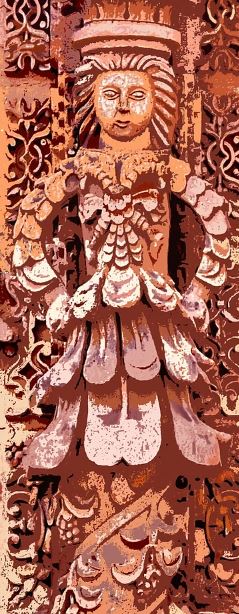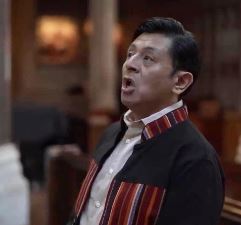Argentina, Baroque, Birak Barkakaty, Bolivia, Domenico Zipoli, El Parnaso Hyspano, Inca, Jesuits, Kate Smith, Latin America, Michael Walling, Rafael Montero, spiritiual
Loyola
Joyful Exploration of the Obscure
Loyola
by Domenico Zipoli
El Parnaso Hyspano at the Grimeborn Festival at the Arcola Theatre, Dalston until 12th August
Review by Patrick Shorrock
To be brutally frank, I am not convinced that Zipoli’s Loyola is actually an opera. It is contemplative rather than dramatic, and a staging doesn’t seem to add very much to what is a long cantata or a short oratorio. But, having got the pedantry out of my system, I can focus on celebrating Zipoli’s marvellous score, a glorious piece of musical fusion combining Baroque oratorio with South American influences from the people who were intended to perform it.
Zipoli (1688-1726) was an Italian Baroque composer, who became a Jesuit and went with 53 missionaries to Argentina, where he taught music. Originally written around 1720 for performance by indigenous musicians on the Jesuit missions in Latin America, the score was recently discovered in in Bolivia.
The score has a freshness and directness that is delightful, with lots of short arias and barely any recitative. I had concerns about imperialism and forcing an alien musical culture on indigenous people. Loyola, the founder of the Jesuits, has left behind him a legacy that might be described as ambiguous, combining spiritual depth with a cult-like obedience, as well as a – perhaps not wholly fair – reputation for casuistry, although none of that was evident in what seemed an uncomplicated celebration of sanctity. But these reservations are blasted out of the water by the quality of the music.
The superb performance by El Parnaso Hyspano – an ensemble led by Inca tenor Rafael Montero, dedicated to authentic performances of the Latin American baroque – undeniably helped here. This is a tradition that needs further exploration and more performances.
El Parnaso Hyspano is certainly the group to do it and on this evidence it deserves a residency at Wigmore Hall. Rafael Montero as Loyola has a timbre that is not like that of a conventional operatic tenor and in Michael Walling’s contemporary production he is weakened by sickness on a hospital bed linked to a drip and monitors. But he is increasingly convincing and is well supported by other singers including Kate Smith’s gorgeously ethereal pure tones as St Francis and Birak Barkakaty’s fine countertenor. The Arcola is an ideal place for hearing a theorbo and the instrumentalists also included two violins, guitar, cello-gamba and percussion with a thrilling baroque trumpet from Tom Watts to finish.
The production began with a short film about Zipoli with lots of talking heads – but even so the piece was less than an hour long. Setting it in a modern hospital provided an effective setting although I’m not really sure that it belongs on the stage. This piece may be obscure but is certainly worth doing.
Patrick Shorrock, August 2023
Photography courtesy of El Parnaso Hyspano
⭐⭐⭐⭐
Rating: 4 out of 5.From → Arcola Theatre, Music, Opera
Leave a comment Cancel reply
This site uses Akismet to reduce spam. Learn how your comment data is processed.


